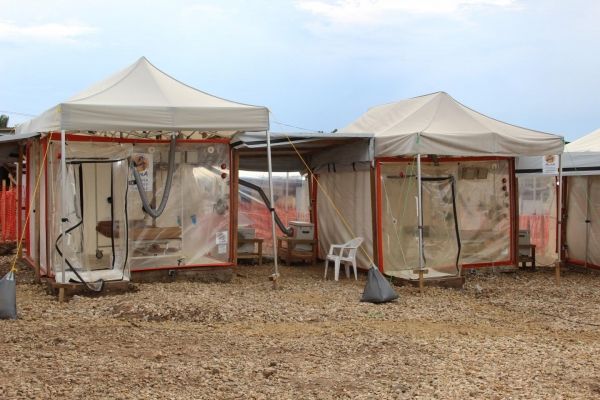The investigational therapeutics mAb114 and REGN-EB3 offer patients a greater chance of surviving Ebola virus disease (EVD) compared to the investigational treatment ZMapp, according to published results from a clinical trial conducted in the Democratic Republic of the Congo (DRC). The new report also shows that early diagnosis and treatment are associated with an increased likelihood of survival from EVD.
The results appear online this week in The New England Journal of Medicine. An announcement made on August 12, 2019, noted that the study leaders halted the trial early, on August 9, 2019, as recommended by an independent data and safety monitoring board based on its review of preliminary data from 499 study patients. The preliminary analysis found that both mAb114 and REGN-EB3 performed better than ZMapp. The fourth drug, remdesivir, performed similarly to ZMapp. Today’s publication provides a comprehensive analysis of the full dataset from nearly 200 additional patients enrolled in the clinical study.
The clinical trial known as PALM, short for “Pamoja Tulinde Maisha,” a Kiswahili phrase that translates to “together save lives,” was organized by an international research consortium coordinated by the World Health Organization (WHO). It is led and funded by the DRC’s National Institute for Biomedical Research (INRB) and Ministry of Health, and the National Institute of Allergy and Infectious Diseases (NIAID), part of the U.S. National Institutes of Health. Professor Jean-Jacques Muyembe-Tamfum, M.D., Ph.D., director-general of the INRB and head of the DRC’s Ebola response, and Richard T. Davey, Jr., M.D., deputy director of NIAID’s Division of Clinical Research, are co-principal investigators for the study.
Read more at NIH/National Institute of Allergy and Infectious Diseases
Image: The Ebola treatment center (ETC) in Beni, Democratic Republic of the Congo. Operated by The Alliance for International Medical Action (ALIMA), the Beni ETC enrolled patients in the PALM study of Ebola therapeutics. The ETC is now operated by MSF. (Credit: ALIMA)


